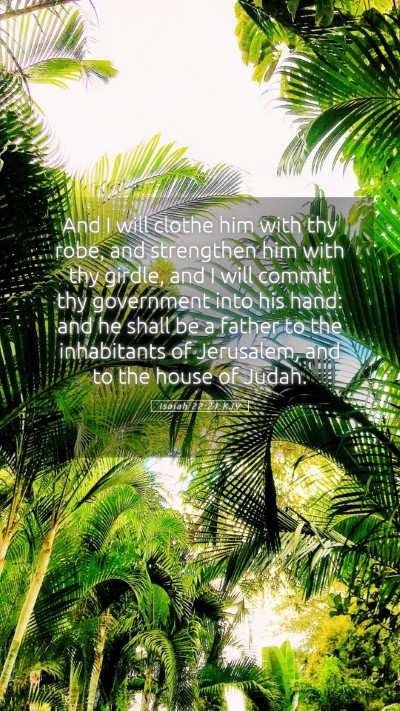Understanding Isaiah 22:21
Isaiah 22:21 states, "And I will clothe him with thy robe, and strengthen him with thy girdle; and I will commit thy government into his hand: and he shall be a father to the inhabitants of Jerusalem, and to the house of Judah." This verse carries profound meanings rooted in the themes of leadership, authority, and divine appointment. Below is a comprehensive analysis of this scripture drawing on insights from renowned public domain commentaries.
Verse Meaning and Interpretation
This verse is part of a prophetic passage where God is communicating His intention to replace Shebna, the current steward or treasurer, with Eliakim. The significance of this is layered with theological implications, particularly regarding God's sovereignty and choice in leadership.
Commentary Insights
-
Matthew Henry's Commentary:
Henry emphasizes the symbolic act of clothing Eliakim with the robe and girdle, which signifies God's approval and empowerment for the role of leadership. This act conveys that Eliakim will be endowed with the authority and responsibility to guide the people of Judah. Henry also points out that Eliakim is presented as a 'father' figure to Jerusalem, indicating a nurturing and protective role.
-
Albert Barnes' Notes:
Barnes elaborates on the transformation of leadership from Shebna, whose arrogance led to downfall, to Eliakim, who embodies faithfulness and divine favor. The commentary reflects on how God’s choices may overturn human expectations, using Eliakim as an instrument for His purposes. The verse also highlights the importance of divine guidance in governance.
-
Adam Clarke's Commentary:
Clarke provides further context by discussing the historical backdrop of Isaiah’s prophecy. He notes that Eliakim's appointment is significant for the stability of the nation during tumultuous times. Clarke also connects the scripture to themes of restoration and hope for Israel, suggesting that God’s leadership is a source of strength for the people.
Divine Appointment and Leadership
Isaiah 22:21 serves as a potent reminder of God's role in appointing leaders and the qualities that are valued in such roles. This reflects not only in historical context but also in modern application, reminding us that true leadership is supported by divine wisdom and compassion.
Significance in Scripture
- Leadership is frequently discussed throughout the Bible, with various examples illustrating both positive and negative leadership. Isaiah 22:21 stands as a testament to the type of leadership that God endorses.
- The idea of being a 'father' to the people emphasizes the need for leaders to exhibit care, protection, and responsibility for those they govern.
Cross References
- Jeremiah 23:4: Speaks of God raising shepherds for His people.
- Luke 22:26: Jesus teaches about leadership in His kingdom being defined by service.
- 1 Peter 5:3: Exhorts leaders to shepherd with willingness and not for selfish gain.
Applying Isaiah 22:21 to Daily Life
In understanding scripture, we can draw lessons from Isaiah 22:21 on the values of integrity, stewardship, and compassion in our roles—be they in family, work, or community settings. The call to be 'fathers' (or parental figures) can be interpreted widely, urging us to care for those around us actively.
Conclusion
Isaiah 22:21 not only serves as a historical narrative but also provides timeless principles applicable to anyone seeking God’s guidance in leadership and relationships. By delving into the meanings of this verse through various commentaries, one can gain profound insights into the nature of divine authority and its implications for our lives today.


